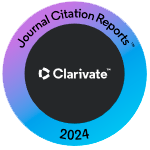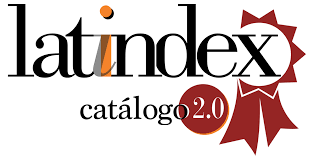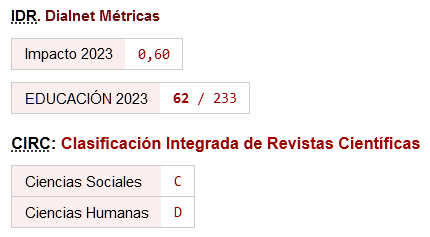Academic Problems Facing University Students under the Corona pandemic from Their Viewpoints
DOI:
https://doi.org/10.46661/ijeri.6411Keywords:
Academic Problems, Corona Pandemic, University StudentsAbstract
The study aimed to identify the academic problems facing university students during the Corona pandemic from their viewpoints and its relationship to some variables, as the study sample comprised (4000) male and female students from Jordanian universities. The study concluded that the students’ academic problems during the Corona pandemic were average in all fields of study. The study showed the absence of statistically significant differences in the students’ academic problems attributed to gender (male, female), specialization (scientific, humanitarian) and academic level (diploma, bachelor) variables.
Downloads
References
Al-Anqari, S. (2017). Academic and administrative problems facing students of the preparatory year at King Saud University from the students' viewpoints(in Arabic). Fayoum University Journal of Educational and Psychological Sciences, 3 (7), 278-324. https://files.eric.ed.gov/fulltext/ED616454.pdf
Al-Anzi, M. (2016). Academic obstacles and administrative problems facing preparatory year students as they are perceived at the University of Tabuk after their distribution to their colleges (in Arabic). Journal of Scientific Research in Education, Ain Shams University, 5 (17), 65-100.
Al-Damiati, S, I. (2020). Academic problems of Taibah University female students and their relationship to the level of performance - a field study, within the activities of the scientific symposium entitled Higher Education for Girls, Deportation and Aspirations, from 4-6-2020, Taibah University in Madinah, 96-140.
Alghamdi, A.A (2021) Impact of the COVID-19 pandemic on the social and educational aspects of Saudi university students' lives. PLoS ONE 16(4): e0250026.https://doi.org/10.1371/journal.pone.0250026
Al-Kandari, A. M.(2-19). Some Problems Facing Students' of Faculty of Basic Education in Kuwait. Bulletin of the Faculty of Education, Qatar University, (14), 629-659.
Al-Khasawneh, A., & Obeidallah, R. (2015). Factors contributing to e-learning success: A case study in the Hashemite University. International Journal of Information Communication Technology Education, 11(3), 30-38. https://doi.org/https://doi.org/10.4018/ijicte.2015070103
Al-Khazaleh, A. O.(2019). Academic Problems facing the students of Faculty of Science and Arts at Sharora Najran University in light of some variables. Journal of Educational Sciences, (2).
Alkhawaja, MI, & Abd Halim, MSB (2019). Challenges of E-Learning System Adoption in Jordan Higher Education. International Journal of Academic Research in Business and Social Sciences, 9(9), 487–494. http://dx.doi.org/10.6007/IJARBSS/v9-i9/6317
Higher Education. International Journal of Academic Research in Business Social Sciences, 9(9), 487-494.https://doi.org/https://doi.org/10.6007/ijarbss/v9-i9/6317
Al-Muhaisi, M, O. (2018). Academic problems for students of the Arabic certificate in Sudanese universities and their relationship to some psychological and educational variables. Yearbook of Teachers College in AbhaIssue (9), 252-273.
Al-Najim, S.(2020). Some Problems as perceived by King Faisal University students. Scientific Journal of King Faisal University (Humanities and Management Sciences, 3(1), 137-176.
Al-Rahimi, A. (2018). Difficulties facing preparatory year students at Saudi Electronic University in learning the English language and their attitudes towards it (in Arabic). Journal of College of Education, Tanta University. 70 (2), 602-642.
Al-Roqi, M. (2016). Academic problems facing first-year students in Afif colleges and their relationship to their Academic Performance (in Arabic). Journal of College of Education, Al-Azhar University, 35 (170), 711-749.
Al-Salem, M., & Al-Ghamdi, A. (2019). Measuring the level of psychological stress and its relationship to self-concept among deaf students at the Deanship of the Preparatory Year at King Saud University (in Arabic). The Educational Journal, Kuwait University, 33 (132), 201-238.
Al-Salman, S. & Haider, AS (2021). Jordanian university students' views on emergency online learning during COVID-19. Online Learning, 25(1), 286-302. https://doi.org/10.24059/olj.v25i1.2470
Al-Shahrani, A. (2016). Obstacles facing preparatory year students in Saudi universities (Al-Jouf University as a model) and ways to overcome them, a suggested scenario (in Arabic). The Arab Journal of Education, the Arab Organization for Education, Culture and Science, 35, 96-140.
Bao, W. (2020). COVID‐19 and online teaching in higher education: A case study of Peking University. Human Behavior and Emerging Technologies, 2(2), 113-115. https://doi.org/10.1002/hbe2.191
Bensaid, B., & Brahimi, T. (2021). Coping with COVID-19: Higher education in the GCC Countries. In A. Visvizi, MD Lytras & NF Aljohani (Eds.), Research and Innovation Forum 2020: Disruptive Technologies in Times of Change (pp. 137-153). Springer.https://doi.org/10.1007/978-3-030-62066-0_12
Bismala, L, Manurung, Y. (2021). Student satisfaction in e-learning along with the COVID-19 pandemic with important performance analysis. International Journal of Evaluation and Research in Education (IJERE), 10(3), 753-759. http://doi.org/10.11591/ijere.v10i3.21467
Bouchey, B., Gratz, E., & Kurland, S. (2021). Remote student support during COVID-19: Perspectives of chief online officers in higher education. Online Learning, 25(1), 28-40. https://doi.org/10.24059/olj.v25i1.2481
Cadloff, E. (2020). The big transition begins as faculty switch to online learning in response to COVID-19. University Affairs.https://www.universityaffairs.ca/news/news-article/the-big-experiment-begins-as-faculty-switch-to-online-learning-in-response-to-COVID-19/
Cao, W., Fang, Z., Hou, G., Han, M., Xu, X., Dong, J., et al. (2020). The psychological impact of the COVID-19 epidemic on college students in China. Psychiatry Research, 287, 112934.https://doi.org/10.1016/j.psychres.2020.112934
Cavanagh, T., Chen, B., Lahcen, R. & Paradiso, J. (2020). Constructing a Design Framework and Pedagogical Approach for Adaptive Learning in Higher Education: A Practitioner's Perspective. International review of research in open and distributed learning, 21 (1), 173–197.https://doi.org/10.19173/irrodl.v21i1.4557
Collins J Valerius L. King T. & Grham A. (2001) The Relationship Between College Students Self- Esteem and the Frequency and Importance of their Participation in Frequency and Activities Nirsa Journal, 18 (1),63-69. https://doi.org/10.1123/nirsa.25.2.38
Cottrell, R. (2021). Student performance in online classes at a Hispanic-Serving Institution: A study of the impact of student characteristics in online learning. Online Learning, 25(3), 18-35. https://doi.org/10.24059/olj.v25i3.2853
Ebner, M., Schön, S., Braun, C., Ebner, M., Grigoriadis, Y., Haas, M., Leitner, P. & Taraghi, B. (2020). COVID-19 epidemic as e-learning boost? Chronological development and effects at an Austrian university against the background of the concept of “e-learning readiness.” Future Internet, 12(6), 94.https://doi.org/10.3390/fi12060094
Erarslan, A., & Şeker, M. (2021). Investigating e-learning motivational strategies of higher education learners against online distractors. Online Learning, 25(2), 262-279. https://doi.org/10.24059/olj.v25i2.2252
Erdem, A. R. (2016).Organizational culture in Higher Education. in Nwachukwu Prince Ololube Research on organizational justice and culture in Higher Education institutions. (pp.255-281).IGI Global. https://doi.org/10.4018/978-1-4666-9850-5.ch011
Flouh, A. (2019). An investigation of some university student problems in light of some variables (a field study). Journal of Social Studies and Research - Martyr Hama Lakhdar University, (29), 99-114.
Giridharan, B. (2020). Engaging with students and faculties online in the era of the coronavirus pandemic: a higher education perspective. Journal of Humanities and Social Sciences Research, 2(S), 103–110.https://horizon-jhssr.com/view-issue.php?id=27
Haider, AS, & Al-Salman, S. (2020). Dataset of Jordanian University Students' Psychological Health Impacted by Using E-learning Instruments during COVID-19. Data in Brief, 32, 106104. https://doi.org/10.1016/j.dib.2020.106104
Hart, CMD, Xu, D., Hill, M., & Alonso, E. (2021). COVID-19 and community college instructional response. Online Learning, 25(1), 41-69. https://doi.org/10.24059/olj.v25i1.2568
International Association of Universities. (2020). The impact of COVID-19 on higher education worldwide Resources for Higher Education Institutions.https://www.iau-aiu.net/IMG/pdf/COVID-19_and_he_resources.pdf
Issa, RI&saleh, A.J. (2019). The difficult application of modern Education Technology from the viewpoints of the members of the teaching staff. Journal of University of Babylon, pure and Applied sciences, 27(1), 206-227. https://doi.org/10.29196/jubpas.v27i1.2114
Means, B., & Neisler, J. (2021). Teaching and learning in the time of COVID: The student perspective. Online Learning, 25(1), 8-27.https://doi.org/10.24059/olj.v25i1.2496
Mervosh, S., & Swales, V. (2020, March 12). Colleges and Universities Cancel Classes and Move Online Amid Coronavirus Fears. The New York Times. https://www.nytimes.com/article/coronavirus-closings.html
Mohmmed, AO, Khidhir, BA, Nazeer, A., & Vijayan, VJ (2020). Emergency remote teaching during Coronavirus pandemic: the current trend and future directive at Middle East College Oman. Innovative Infrastructure Solutions, 5. https://doi.org/10.1007/s41062-020-00326-7
Motz, BA, Quick, JD, Wernert, JA, & Miles, TA (2021). A pandemic of busywork: Increased online coursework following the transition to remote instruction is associated with reduced academic achievement. Online Learning, 25(1), 70-85. https://doi.org/10.24059/olj.v25i1.2475
Murphy, MPA (2020). COVID-19 and emergency eLearning: Consequences of the securitization of higher education for post-pandemic pedagogy. Contemporary Security Policy, 41(3), 492–505.https://doi.org/10.1080/13523260.2020.1761749
Nuere, S., & de Miguel, L. (2020). The digital/technological connection with COVID-19: An unprecedented challenge in university teaching. Technology, Knowledge, and Learning, 26, pages931–943 .https://doi.org/10.1007/s10758-020-09454-6
Olaimat, AN, Aolymat, I., Shahbaz, HM, & Holley, RA (2020). Knowledge and Information Sources About COVID-19 Among University Students in Jordan: A Cross-Sectional Study. Frontiers in Public Health, 8(254).https://doi.org/10.3389/fpubh.2020.00254
Othman, Y. (2017). The level of satisfaction of male and female students of the engineering track colleges about studying in the preparatory year at the University of Dammam in light of some variables (in Arabic). The Egyptian Journal of Scientific Education, 20 (12), 183--218.
Sulaiman, S., Al-Smadi, Abdallah.(2019). Academic Problems for College teachers in Saudi Arabia in light of major and academic level variables. Journal of Arabic Gulf, (109), 1-47.
Thatcher, A., Zhang, M., Todoroski, H., Chau, A., Wang, J., & Liang, G. (2020). Predicting the impact of COVID-19 on Australian universities. Journal of Risk and Financial Management, 13(9) 188.https://doi.org/10.3390/jrfm13090188
UNESCO (2020, April 20). Disruption of education due to COVID-19 and the response to it (in Arabic). https://en.unesco.org/COVID19/educationresponse
United Nations (2020, April 1). Five things you should know now about the COVID-19 pandemic.https://news.un.org/en/story/2020/03/1059261
United Nations Economic and Social Commission for Western Asia (ESCWA). (2020, April 1). A regional emergency response report to mitigate the repercussions of the epidemic Coronavirus. (in Arabic). https. //www.unescwa.org/ar
Upoalkpajor, J.L., & Upoalkpajor, C.B. (2020). The Impact of COVID-19 on Education in Ghana. Asian Journal of Education Social Studies, 9(1), 23-33. https://doi.org/https://doi.org/10.9734/ajess/2020/v9i130238
World Health Organization. (2020). Corona Virus Disease (COVID-19). https://www.who.int/ar/emergencies/diseases/novel-coronavirus-/question-and-answers-hub/qa-detail/coronavirus-disease-201919COVID-
Yang C, Chen A, Chen Y (2021) College students' stress and health in the COVID-19 pandemic: The role of academic workload, separation from school, and fears of contagion. PLoS ONE 16(2): e0246676.https://doi.org/10.1371/journal.pone.0246676
Zhang, J., Lou X., Zhang, H., & Zhang, J. (2019). Modeling collective attention in online and flexible learning environments. Distance Education, 40(2). 278-301. https://doi.org/10.1080/01587919.2019.1600368
Zimmerman, W., Altman, B., Simunich, B., Shattuck, K., & Burch, B., (2020). Evaluating online course quality: A study on the implementation of course quality standards. Online Learn. J., 24 (4),147-163. https://doi.org/10.24059/olj.v24i4.2325
Published
How to Cite
Issue
Section
License
Copyright (c) 2023 Mohammad Omar AL-Momani, Insaf George Alrabadi, Maaly mefleh al-mzary, Hanaa Mustafa danaa, Smah Suleiman al-jarah

This work is licensed under a Creative Commons Attribution-NonCommercial-NoDerivatives 4.0 International License.











